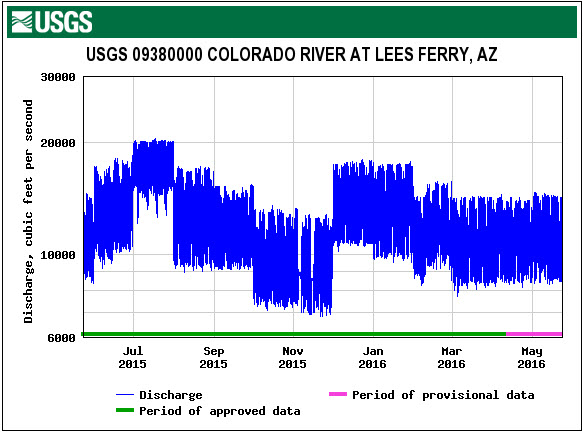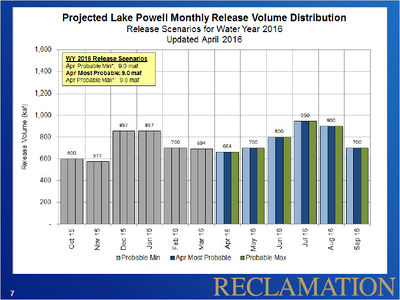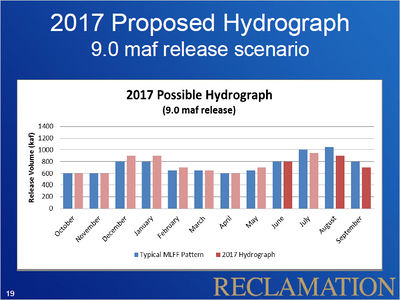Difference between revisions of "GCDAMP Glen Canyon Dam"
Cellsworth (Talk | contribs) |
Cellsworth (Talk | contribs) |
||
| Line 53: | Line 53: | ||
*[https://www.usbr.gov/uc/water/rsvrs/ops/aop/index.html Annual Operating Plans for Colorado River reservoirs] | *[https://www.usbr.gov/uc/water/rsvrs/ops/aop/index.html Annual Operating Plans for Colorado River reservoirs] | ||
| + | |||
| + | ===[http://www.usbr.gov/uc/water/crsp/cs/gcd.html ''Operational Flexibility'']=== | ||
| + | |||
| + | In addition to daily scheduled fluctuations for power generation, the instantaneous releases from Glen Canyon Dam may also fluctuate to provide 40 megawatts (mw) of system regulation. These instantaneous release adjustments stabilize the electrical generation and transmission system and translate to a range of about 1,200 cfs above or below the hourly scheduled release rate. Under system normal conditions, fluctuations for regulation are typically short lived and generally balance out over the hour with minimal or no noticeable impacts on downstream river flow conditions. | ||
| + | |||
| + | Releases from Glen Canyon Dam can also fluctuate beyond scheduled releases when called upon to respond to unscheduled power outages or power system emergencies. Depending on the severity of the system emergency, the response from Glen Canyon Dam can be significant, within the full range of the operating capacity of the power plant for as long as is necessary to maintain balance in the transmission system. Glen Canyon Dam typically maintains 30 mw (approximately 880 cfs) of generation capacity in reserve in order to respond to a system emergency even when generation rates are already high. System emergencies occur fairly infrequently and typically require small responses from Glen Canyon Dam. However, these responses can have a noticeable impact on the river downstream of Glen Canyon Dam. | ||
|} | |} | ||
Revision as of 15:57, 15 February 2017
|
Current OperationsThe operating tier for water year 2016 was established in August 2015 as the Upper Elevation Balancing Tier. The April 2016 24-Month Study established that Lake Powell operations will be governed by balancing for the remainder of water year 2016. Under balancing, the contents of Lake Powell and Lake Mead will be balanced by the end of the water year, but not more than 9.0 maf and not less than 8.23 maf shall be released from Lake Powell. Based on the most probable inflow forecast, this June 24-Month Study projects a balancing release of 9.0 maf in water year 2016; the actual release in water year 2016, however, will depend on hydrology in the remainder of water year and will range from 8.23 to 9.0 maf. The projected release from Lake Powell in water year 2016 will be updated each month throughout the remainder of the water year. Reclamation will schedule operations at Glen Canyon Dam to achieve as practicably as possible the appropriate total annual release volume by September 30, 2016. In June, the release volume will be approximately 800 kaf, with fluctuations anticipated between about 9,000 cfs in the nighttime to about 17,000 cfs in the daytime and consistent with the Glen Canyon Operating Criteria (Federal Register, Volume 62, No. 41, March 3, 1997). The anticipated release volume for July is 950 kaf with daily fluctuations between approximately 11,500 cfs and 19,500 cfs. The expected release for August is 900 kaf with daily fluctuations between approximately 10,000 cfs and 18,000 cfs. |
| --- | --- | --- |
|---|
|
|


